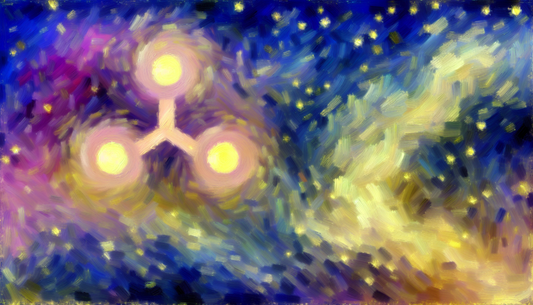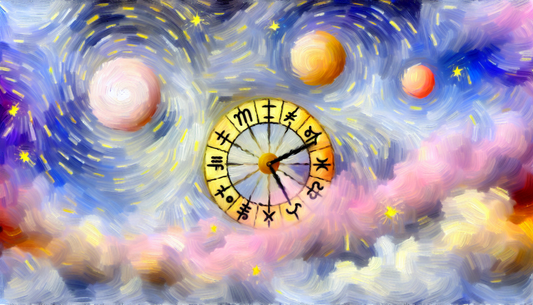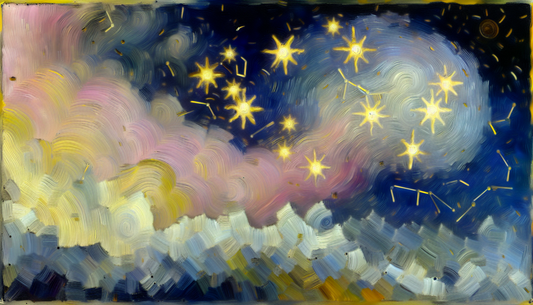Astrology, the study of celestial bodies and their influence on human life, has a rich and diverse history across various cultures. Throughout the ages, different civilizations have interpreted the movements of planets and stars in their unique ways, creating a tapestry of astrological beliefs and practices. Let’s explore how astrology manifests in different cultures around the world, shedding light on the similarities and differences that make this ancient discipline so fascinating.
Astrology in Ancient Egypt

In Ancient Egypt, astrology was deeply intertwined with religion and daily life. The Egyptians associated celestial phenomena with their gods, seeing the heavens as a reflection of divine will. The most notable contribution from this culture is the concept of the "Decans," which are 36 divisions of the night sky that helped them predict the rising of stars and determine agricultural cycles. The Decans were crucial in setting the calendar and defining sacred times for rituals, showcasing how astrology was both practical and spiritual.
The most famous Egyptian figure in astrology is the goddess Nut, the sky goddess, who was often depicted arching over the Earth, representing the connection between humans and the cosmos. The Egyptians believed that the position of the stars at the time of one's birth could impact their destiny, leading to a rich tradition of astrological practices that influenced later Western astrology.
Chinese Astrology

Chinese astrology stands out with its unique zodiac system, which is based on a twelve-year cycle, each year represented by an animal. The Chinese zodiac includes Rat, Ox, Tiger, Rabbit, Dragon, Snake, Horse, Goat, Monkey, Rooster, Dog, and Pig. Each of these animals embodies specific traits, and the interactions between them create a complex personality framework that many Chinese people consider when making important life decisions.
Beyond the zodiac, Chinese astrology also considers the lunar calendar and the Five Elements (Wood, Fire, Earth, Metal, Water). The interplay of these elements with the zodiac animals determines a person’s temperament, compatibility, and fate. This rich astrological tradition emphasizes harmony with nature and the importance of understanding one’s place in the universe, encouraging practitioners to cultivate balance in their lives.
Western Astrology
Western astrology, which has evolved over thousands of years, owes much to the Hellenistic traditions that emerged after the conquests of Alexander the Great. This system is heavily based on the twelve zodiac signs, which correspond to the constellations along the ecliptic. Unlike Chinese astrology, Western astrology combines the positions of the planets in relation to the Earth at the time of birth to create a natal chart or horoscope.
Astrologers in the Western tradition analyze the influence of the Sun, Moon, and planets across the twelve houses, each representing different aspects of life, from career to relationships. This detailed analysis produces insights about a person's personality and future. The Western zodiac is characterized by its focus on individualism and personal growth, which is reflective of the cultural values prevalent in the Western world.
Vedic Astrology
Vedic astrology, also known as Jyotish, originates from ancient India and has been shaped by the spiritual philosophy of Hinduism. This system emphasizes the Moon's position at birth, rather than the Sun's, which is central to Western astrology. Vedic astrology includes the concept of the Nakshatras, or lunar mansions, which provide detailed insights into a person's nature and future.
Vedic astrologers use a sidereal zodiac, which aligns more closely with the actual positions of the stars compared to the tropical zodiac used in Western astrology. This difference results in a shift of about 23 degrees, meaning that many people may find their Vedic zodiac sign differs from their Western sign. The Vedic approach is holistic and emphasizes cosmic connections, suggesting that understanding one's karma is vital to success and happiness.
Native American Astrology
Native American astrology is deeply rooted in nature and the cyclical rhythms of the Earth. Many tribes rely on the medicine wheel, which encompasses the four cardinal directions and correlates them with specific animal totems and elements. Each direction signifies different phases of life and personality traits, offering a unique perspective on astrology.
For instance, the East is often associated with new beginnings and the Eagle, symbolizing vision and clarity, while the North represents wisdom and the Bear, embodying courage and strength. This type of astrology emphasizes harmony with nature and a respect for the ancestral spirits, highlighting the importance of community and interconnectedness in understanding one's destiny.
The Fascination with Astrology Today
Astrology has seen a resurgence in popularity across the globe, partly fueled by social media and digital platforms that allow for easy access to astrological content. Many young people are embracing astrology as a means of self-exploration and personal growth, choosing to engage with their zodiac signs through memes, articles, and interactive horoscopes.
Moreover, astrology’s appeal lies in its ability to provide comfort and guidance in uncertain times. Whether one believes entirely or just surveys the possibilities, astrology offers a lens through which many interpret their life's events. From finding love to achieving career success, the cosmic influence resonates with individuals seeking meaning in a fast-paced world.
Conclusion: A Unifying Threads Across Cultures
While astrology varies widely across cultures, its central premise remains strikingly similar: a belief in the interconnectedness of our lives and the cosmos. From the pyramids of Egypt to the medicine wheel of Native American tribes, astrology serves as a framework through which we can seek understanding and insight.
In the age of globalization, the blending of astrological practices invites a collaborative exploration of this ancient wisdom. Not only does this create a platform for cultural exchange, but it also enhances our collective understanding of our place in the universe. Embracing the astrological legacies from different cultures can enrich our lives and deepen our connection to the cosmos, proving that the stars have something to say to each of us, no matter where we come from.















